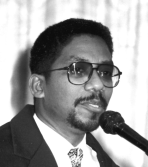

Message Board
Trini Newspapers
’ Online Forums
’ International News
’ Caribbean Links
|

Unions have failed to develop
June 25, 2002
by Clyde Weatherhead
Greetings to the workers and other labouring people of Trinidad and Tobago on the occasion of the 65th Anniversary of the anti-colonial uprising now popularly known as the "Butler Riots".
As a former leader of the trade union movement and continuing supporter of the trade union and workers' movement, I feel compelled to comment on the current situation in the trade union movement.
For another year, the financial oligarchy, their political parties and government are enjoying the spectacle of trade union leaders engaging in threats against each other and against workers on this occasion.
This robber talk session probably serves to inflate the egos of certain union leaders, but does absolutely nothing to advance the interests of the workers, organised and those not in unions.
I have heard the continuing appeals of Clive Nunez who last year begged and pleaded for a single June 19 celebration and now echoed by George DePeana, General Secretary of the CCL.
However, no amount of formal appeals for public displays of "unity" by leaders of trade unions is going to solve the deep problem plaguing the trade union movement.
I have also heard David Abdulah's assertion that the current split among the unions is the result of politics. By this, I guess he means, that some unions are supporting one party and others are claiming to be independent of the parties of the rich.
Well, it is politics that is the problem — the absence of independent politics of the working class. That is my view.
That includes the lack of democracy in the trade union movement in which the voices of the workers are silenced or at best ignored.
The trade union movement has no programme, no rallying set of demands that will build the Unity in Action of the workers fighting for a common set of demands in a struggle for a common objective.
Such was the case in 1937 when the top demand was "Let Those Who Labour Hold the Reins!"
It was also the case in the late 1960's into 1970 that there was such a programme of common demands and again in the period just leading to the formation of NATUC in 1991.
The unity of the workers will be built on the basis of the common fight for their common interests and demands, not by agreements among trade union leaders.
It is a fact of history that at all of those periods I have mentioned there were differences of political opinion, affiliation and support among workers' and trade union leaders and workers. Yet, they were able to fight on a common platform of demands.
Remember, in the 1930's Cipriani, Butler, Barratt all had or supported different organisations and parties. Remember, in the late 60's and in 1970 many trade union leaders belonged to different organisations and parties.
Recall in 1989 and up to the formation of NATUC trade union leaders were members and supporters of the PNM, NAR, etc. Well, what was different two years ago when NATUC was split or today?
I suggest nothing in that regard. Some unions for years were known as party groups of the DLP, PNM etc. Yet, the workers were able to fight together for common demands.
The issue today, in my opinion, is that the trade union leaders have failed to develop or to allow the members themselves to advance such a platform of common demands on which to fight.
Things are so bad that unions find it impossible to even make statements in support of each other. For the last two months, the silence has been deafening in the face of a draconian injunction imposed on the PSA by the PNM regime. The same silence greeted another injunction imposed by the UNC on the same union at the end of year 2000.
Little was said in support of the sugar workers whose jobs were put on the line by the UNC when they signed the IADB loan agreement with reduction of the workforce as a conditionality, or when the PNM threatened to implement the UNC plan.
The silence is a reflection of the outlook that now dominates unions whose leaders see them as "service providers" and see their members as clients who pay premiums in case they have a problem.
The unions belong to the workers and their voices must be raised to formulate and demand a common programme on which they can build their unity in the course of fighting for those demands. The democracy in the trade union movement requires that workers break the silence and make their voices be heard.
It was such as situation, as in the face of a movement divided into Labour Congress and Council of Progressive Unions, such a common platform was forged, with the workers raising their voices, in the Joint Trade Union Grouping, then Joint Trade Union Movement and finally the formation of NATUC as a single trade union centre.
The discontent of the workers with the unions at this time is manifesting itself in the low membership of unions, in workers leaving unions altogether or to form their own unions, workers taking unions to court for negligence and so on.
The workers must organise themselves, take bold steps and raise their demands within each union and among all the unions and fight in the spirit of 1937 for the establishment of a common programme and a common plan of action.
Only in this way will the unity of the trade union movement be restored.
Trinicenter | Clyde's Homepage
Copyright © Clyde Weatherhead
Site Designed and maintained By: Trinicenter.com.
|
